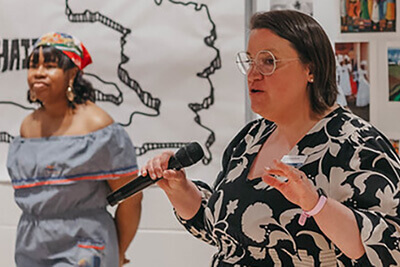May 9, 2024
 It was from a former colleague that Liz DesLauriers heard about Pilot Light, a Food Education organization that works nationwide to refine lessons and evaluate food education.
It was from a former colleague that Liz DesLauriers heard about Pilot Light, a Food Education organization that works nationwide to refine lessons and evaluate food education.
“A former co-worker told me about this,” DesLauriers said, who joined on a fellowship for the 2023-2024 school year. “I’ve always done a lot of food education in my classroom, so this step to doing this fellowship wasn’t that much of a change or a big difference from what I am already doing.”
Since the discovery, DesLauriers has found Pilot Light to be a way to further ignite her cuisine teaching in her French classroom to benefit MPA.
“Since joining the fellowship, I’ve definitely put deeper meaning into my food education lessons and approached it from different angles,” she said. “I was using food as a venue for culture, which I still do a ton, but now I’m bringing in different aspects of where your food comes from, how does your food benefits you, and what you can do with food your food yourself as a young student to feel healthier or feel creative. I feel like we are diving deeper into cultures because of that.”
The effort has provided dividends in the classroom as the students have reacted fondly to the teachings. Already well into her year-long stint with Pilot Light, DesLauriers is one of 31 fellows in the program for the 2023-2024 school year. It wasn’t an easy process to join Pilot Light, DesLaurier said.
“There was a hefty process at the beginning; it was like applying for a job, really,” DesLauriers said with a laugh.
Though rigorous to join, DesLauriers hasn’t looked back since, enjoying the Pilot Light process. As part of Pilot Light, DesLauriers has been tasked with incorporating the organization’s plans into her lessons.
“They work with seven standards, and their goal is to incorporate a monthly lesson that incorporates that standard. Some are basic, some are more complex,” DesLauriers said.
While DesLauriers works to spread Pilot Light’s teachings, an added wrinkle remains: only three of the fellows are language teachers.
“We have an added layer of doing all these things, but we also need to incorporate the language. It is a goal of mine always to have a language component to each lesson I do,” DesLauriers explained, choosing to use it as a chance for growth. “Teachers are coming at it from every different type of area,” she said.
The mindset had DesLauriers thinking of all the possible ways to spread both the Pilot Light and her own goals from education.
“Into world language, you can interweave it into lessons naturally. The avenues in which you can take these food education lessons are endless,” DesLauriers said.
That’s where the Haiti Celebration came into play. The celebration explored various aspects of Haitian culture, including its geography, history, language, cuisine, music, and art, marching DesLauriers closer to her continued mission.
“That’s one of my cumulative projects, but I’ll continue to incorporate those lessons into the school year and beyond,” said DesLauriers.
Food was present and prominent during the Haiti Celebration, and sampling Soupe Joumou, also known as “Freedom Soup,” was one of the event’s many highlights. While one example DesLauriers collaboration with Pilot Light and one of the more significant projects she undertook, she has no plans of slowing down to help.
“I’ll definitely use the lessons and knowledge I’ve gained this year to continue to enhance my food education.”
DesLauriers’ experience with Pilot Light has inspired her to recommend and actively help grow the program.
“I’ll also have been talking with them about incorporating more language teachers. This is such a gold mine for language teachers. You can learn so much and have awesome prospects to incorporate into your classrooms,” she said. “To collaborate with other teachers across the country is such a cool thing; I highly recommend.”
To learn more about Pilot Light and what Deslauriers contributes to, more information can be found here.